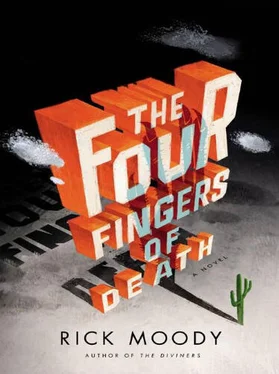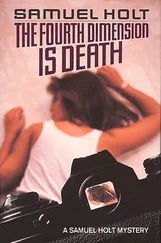Down into the ravine they went, on the far side of the outskirts of town, into some new stratification of rock crumbling on the sides of the road, they hurtled in silence, and the permanence of the rock formations made a mockery of the chimpanzee; he would survive a few more moments, with his hand on the shoulder of the human woman, whispering I felt so strong, just this morning I felt so strong, and now I feel so weak, and I don’t know if I am strong enough now to be out here, in this world of limitless opportunities, which is really a world of poverty and failure , and she smiled and he smiled back at her, a chimpanzee grin, as Koo turned the car around, in the next town, and asked if he wanted something, did he want a soda or something? And the list of things he wanted was so long that Morton sat there in silence, wondering if he could even make a beginning of the description of the something that he wanted, because just as one thirst was slaked, another rose in its stead, and he didn’t know how to call all these needs, all these desires, which were not to be understood as fragmentary and interrupted, but overpowering, because his was a consciousness that appeared ex nihilo, with no self to attach to its fragments, if by self we mean a self that has a story of its coming-to-be, and he cried silently, even as he grinned his chimpanzee grin, with his hand upon Noelle’s shoulder, and perhaps the human animals believed that a chimpanzee weeping was weeping at their success , at the way the chimpanzee was now a part of all that was, the human story, but he was weeping instead at the mess he’d made of things, and the mess that had been made of him, and he couldn’t think of what to say about whether there was something he wanted, so he said he wanted Coca-Cola, which was the most recognized and widely circulated American product, and he had read somewhere that the word was the most commonly understood English-language word, after the word okay , and so maybe Coca-Cola, whatever that was, would make him feel okay , and so he sat in the car, with his hand on Noelle’s shoulder, awaiting his Coca-Cola, and she was so good to let him keep his hand there, as he looked out the window at the desperate and slovenly humans coming and going at the not very convenient convenience store, placating their addictions to small things, that Morton wept, because if he tried to mate with Noelle, the hole in him would spill over across the species boundary, because love was the hole as well as the thing that repaired the hole.
Koo, coming around the side to the open window, handed him a Coca-Cola, muttering something about how it was probably manufactured South of the Border and was therefore better than what was domestically available.
“Morton,” Koo said, settling himself behind the wheel again, turning to face his protégé, the onetime experimental subject, “there’s something I’d like to ask you about, since you are out in the world with me for the afternoon. In fact, it’s just what I was thinking when I came to understand that you probably would enjoy a little trip outside. You see, we are having this big problem just now. And when I say ‘we,’ what I mean is ‘we’ the human race. We are having a bit of a problem. It’s a problem that I think you might be able to help me with. It all started on Mars.”
Happiness Is Submission to God . These words were among the most inscrutable and ineffable bits of antique public signage in Rio Blanco — let’s not get into the old liquor store neon on Ninth Street and those flickering beseechments for motels-by-the-hour lining the thoroughfare called Oracle. Happiness Is Submission to God . Inscribed on a small cottage in the neighborhood of the university, a cottage that had long been yet another staple of off-campus housing for a certain kind of URB student, the kind of student who had come to the campus to be neither pre-law nor premed. In fact, the lineage of the house itself — pale green with evergreen trim, right on the Sixth Street artery as it headed for El Centro— was a subject of enthusiastic conjecture among students of the mind. The entirety of the jihadist movement of the early part of the century was born in this very house, it was said. The slogan painted on the side of the house in part created this movement, though if the Wahhabis who lived there in the 1970s had not painted the quotation from the Qur’an on the side of the building, who had? No matter how far back you dated the building and its slogan, there was someone who had lived there before , who had rented it to the guy, or the woman, who had in turn rented it to the Wahhabis. Therefore, there was no origin for the slogan, only people searching for its origin: Happiness Is Submission to God .
First: the avant-garde theatrical troupe, from the historical epoch in which the phrase avant-garde theatrical troupe was not yet comical, the epoch of drug-perfected mummers who specialized in improvising works of absurdism in which they flung bodily fluids on the audience, invoking and citing works of oriental mysticism, until their parents cut them off. The works of the avant-garde theatrical troupe had lately been experiencing a renaissance, as in the case of the four-hour spectacular Menarche , revived in an abandoned warehouse on the South Side. These players had trashed the house, looted it of some of its gutters, which became props in a dramatic spectacular, and then passed the house — prized, additionally, because of its basement , a rarity in these parts — on to the next quixotic subculture, which was the subculture of the radical political underground . A national fugitive allegedly stayed a night in the house marked Happiness Is Submission to God , belittling the slogan as petty bourgeois, after his participation in a botched armored-truck robbery. This fugitive was taking a lot of pollutants, in order to buck himself up, and so while sleeping there he dreamed of being vivisected by a beloved uncle. As if vivid dreaming were some kind of contagion, or a reaction to valley fever spores, several of the political activists who lived there in this period began having vivid nightmares, in fact, and perhaps this was why they passed the house on to a cadre of videographers. The house stayed in the hands of the film and video department for a good five or six years, and its exterior appeared in many, many documentaries about the treatment of migrant farmworkers, and investigations into civic corruption and its relationship to land acquisition by URB. So routine did life then become in the house on Sixth Street that it was actually in danger of being repainted. Who cared about whether or not happiness was submission to God? There was, it is true, a video in production that purported to interpret the slogan, and since this documentary felt that the slogan was excessively denominational for a building associated with a state-funded institution of higher education, the videographer (and his friends) intended to repaint the house as the climax of the film. However, the problem of regional vermin was concurrently raising its multiple heads and segmented eyes in the house. The cockroaches were a nuisance but were not terribly frightening. Cockroach races, films thereof, were good sport. The lizards occasionally ate the roaches, so the lizards were at first welcome. The pack rats, however, were a little more challenging. One hapless video student narrowly avoided getting bitten by a pack rat. But soon the battle with vermin escalated to the tarantula. Total fumigation was required.
Black nationalists lived there, and these URB students were willing to put up with the occasional tarantula, or at least stories of the tarantula. These African American studies majors and their friends understood that the phrase on the side of the house on Sixth Street was from the Qur’an, and they even claimed to have painted the phrase on the building, though informal historians of Rio Blanco recognized that the slogan was painted before some of these students were out of diapers. Because of its spiritual vibe , these students made the house the center of their operations, where they began to attempt to bring their worldly, Western lives into accord with the precepts of that holy book, a classic of prophecy. Because there were students who lived this way, there was a sympathetic professor, and this professor was willing to offer courses with which they might refine and improve on their interpretation of the Qur’an. In the classes of this firebrand, language could do what culture could not, just by its utterance, just by the intent with which certain words were uttered, how excellent is the recompense of paradise , to utter certain words was to give proper reverence to Muhammad, if there are twenty of you with determination they shall vanquish two hundred , and soon there was a campus major in Islamic studies, and then there were doctorates, and then there were people who came from abroad, whatever misfortune befalls you is a consequence of your deeds , so as to hear about this interpretation of the Qur’an, which was the interpretation of the very word of God, this is the Book free of doubt , and the students were so committed that they had emblazoned their way of life on the side of their house, or at least the emblematic center of their studies, the house on Sixth Street, or so they said.
Читать дальше












